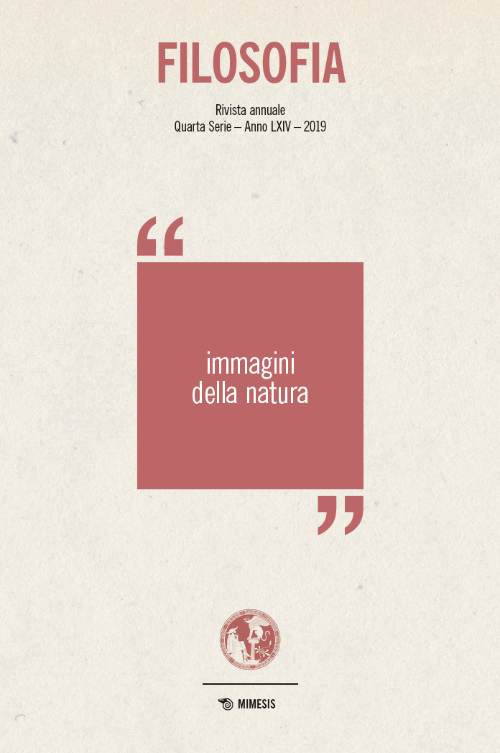Environmental Ethics as an Ascetic Practice in the Age of Technology
DOI:
https://doi.org/10.13135/2704-8195/4060Parole chiave:
technology, responsibility, asceticism, selfAbstract
This paper deals with the asceticism as a strategy of environmental ethics in the late modernity. This strategy can be observed in various political and civic initiatives as measure for reducing excess consumption as well as in various spiritual ecological practises. The extraordinary increase in the power of technology extends our responsibility, limiting it at the same time to a negative kind of action, i.e. an action in which what should not be done is much more obvious than what should be done. The authors who examine the late modernity (Bruno Latour, Ulrich Beck) usually look for ‘technological’ or ‘institutional’ solutions to the ecological crisis, and the question of the responsible subject becomes only one of the variables in the risk management equation. This paper proposes to look for a solution to the crisis of responsibility by posing again a question on the genesis of the ethical subject through the lens of Michel Foucault’s concept of asceticism as ‘technology of the self’.
Downloads
Riferimenti bibliografici
U. Beck, Ecological Politics in an Age of Risk (1988), Engl. transl. by A. Weisz, Cambridge, Polity Press, 1995
U. Beck, Risk Society Revisited: Theory, Politics and Research Programmes, in The Risk Society and Beyond. Critical Issues for Social Theory, ed. by B. Adam, U. Beck and J. Loon, London-New Delhi, Thousand Oaks, 2000
U. Beck, World at Risk (2007), Engl. transl. by C. Cronin, Cambridge, Polity Press, 2009
J. Butler, Giving an Account of Oneself, New York, Fordham University Press, 2005
J. Carter, Energy and the National Goals – A Crisis of Confidence, retrieved from https://www.americanrhetoric.com/speeches/jimmycarter-crisisofconfidence.htm
T. Clark, Derangements of Scale, in Telemorphosis. Theory in the Era of Climate Change, vol. I, ed. by Th. Cohen, Open Humanities Press, 2012, pp. 148-166
É. Darier, Foucault against Environmental Ethics, ed. by É. Darier, Oxford, Blackwell Publishers, 1999, pp. 217-240
H. Fayol, General and Industrial Management (1916), Engl. transl. by C. Storrs, London, Sir Isaac Pitman & Sons, 1948
M. Foucault, Ethics: Subjectivity and Truth, ed. by P. Rabinow, Engl. transl. by R. Hurley and others, New York, The New York Press, 1997
M. Foucault, The Hermeneutics of the Subject: Lectures at the Collège de France, 1981–1982, Engl. transl. by G. Burchell, New York, Palgrave Macmillan, 2005
Global Alliance for Incineration Alternatives (GAIA), On the Road to Zero Waste: Successes and Lessons from Around the World, 2012, retrieved from http://www.no-burn.org/wp-content/uploads/On-the-Road-to-Zero-Waste.pdf
G.G. Harpham, The Ascetic Imperative in Culture and Criticism, Chicago, University of Chicago Press, 1987
Metropolitan John, (Zizioulas) of Pergamon Ecological Asceticism: A Cultural Revolution, in “Orthodox Outlet for Dogmatic Enquiries”, 2009, retrieved from http://www.oodegr.com/english/koinwnia/perival-lon/Ecological_asceticism.htm
B. Johnson, Zero Waste Home: The Ultimate Guide to Simplifying Your Life by Reducing Your Waste, New York, Scribner, 2013
H. Jonas, The Imperative of Responsibility: In Search for an Ethics for the Technological Age (1979), Engl. transl. by H. Jonas with the collaboration of D. Herr, Chicago & London, University of Chicago Press, 1984
H. Jonas, Mortality and Morality: A Search for the Good after Auschwitz, Evanston, North-western University Press, 1996
R. Kearney, Derrida’s Ethical Return, in Working through Derrida, ed. by G. B. Madison, Evanston, Northwestern University Press, 1993, pp. 28-50
N. Klein, This Changes Everything: Capitalism vs. The Climate, New York, London, Toronto, Sydney, New Delhi, Simon & Schuster Paperbacks, 2014
K. T. Kramer, Eco-Asceticism: Preparing for the Future through Discipline Today, in “America: The Jesuit Review”, 2007, November 5, retrieved from https://www.americama-gazine.org/issue/632/faith-focus/eco-asceticism
B. Latour, It’s development, stupid! or: How to Modernize Modernization, p. 10. Retrieved from http://www.bruno-latour.fr/sites/default/files/107-NORDHAUS&SHELLENBERGER.pdf
L. McWhorter, Asceticism/Askesis: Foucault’s Thinking Historical Subjectivity, in Ethics and Danger: Essays on Heidegger and Continental Thought, ed. by A. B. Dallery, Ch.E. Scott and P. H. Roberts, Albany, State University of New York Press, 1992, pp. 243-254
P. Palmer, Getting to Zero Waste, Sebastopol (CA), Purple Sky Press, 2005
R. Peterson, Trash Radicals: Sustainability’s New Ascetic Ideal, in “National Association of Scholars”, 2014, February 27, retrieved from https://www.nas.org/articles/trash_radicals_sustainabilitys_new_ascetic_ideal
I. Rossi, Reflexive Modernization, in Ulrich Beck: Pioneer in Cosmopolitan Sociology and Risk Society, ed. by U. Beck, New York City, Springer, 2014
M. Weber, Religious Rejections of the World and their Directions (1920), in From Max Weber: Essays in Sociology, translated, edited and with an introduction by H. H. Gerth and C. Wright Mills, London, Routledge, 1991
O. Zehner, Green Illusions. The Dirty Secrets of Clean Energy and the Future of Environmentalism, Lincoln and London, University of Nebraska Press, 2012
##submission.downloads##
Pubblicato
Come citare
Fascicolo
Sezione
Licenza
Filosofia applica una licenza Creative Commons Attribution 4.0 International License a tutto il materiale pubblicato.




